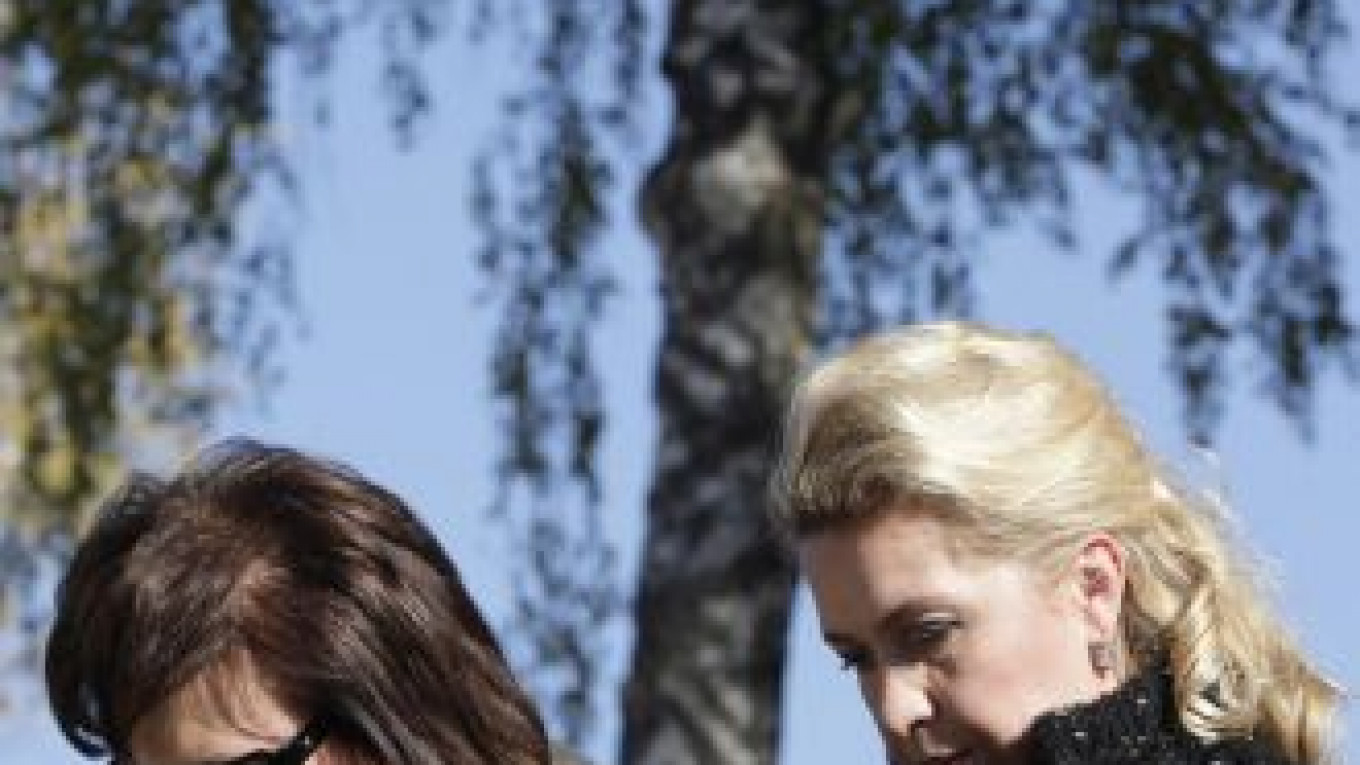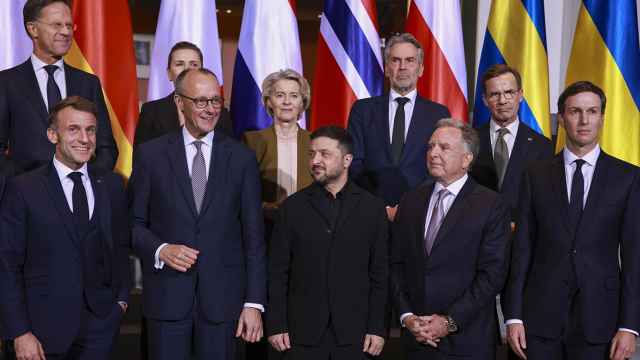WARSAW — Sober calculations of their national interests will keep a rapprochement between Poland and Russia on track, despite tensions over gas supplies and over a probe into April's plane crash that killed the Polish president, analysts said.
At weekend ceremonies in Smolensk commemorating six months since the crash that killed President Lech Kaczynski and 95 other top officials, the first ladies of the two countries said the disaster had brought their nations closer together.
Crowning an improvement in long-frosty ties that began after a pro-European center-right Polish government under Prime Minister Donald Tusk was elected in 2007, President Dmitry Medvedev will pay an official visit to Warsaw on Dec. 6.
"Poland's leaders have made a strategic decision to improve ties with Russia," said Eugeniusz Smolar of the Center for International Relations in Warsaw.
"Tension over the Smolensk investigation may still translate into a worsening of relations in the nearer term but I don't think this will happen," he said. "We want to help Russia make the right decisions about the European Union and NATO."
The thaw between Warsaw and Moscow has run in parallel with a warming of Polish ties with EU heavyweights Germany and France, both of which favor closer cooperation with Russia.
The rapprochement has also been reinforced by U.S. President Barack Obama's pressing of his own "reset" button to improve ties with Russia, whose help he needs on Iran and Afghanistan.
Relatives of some crash victims, including the late president's identical twin brother, Jaroslaw, pointedly shunned Sunday's ceremonies, angry over what they see as Moscow's foot-dragging in the investigation of the disaster's causes. A perception of official obfuscation has seeped into the wider Polish public, with 28 percent saying in a recent poll they were now negative about ties with Russia while 26 percent were positive.
Jaroslaw Kaczynski, leader of Poland's right-wing opposition Law and Justice party, has hinted darkly in interviews that he believes that Russia may have deliberately engineered the crash — a notion dismissed by government officials as absurd.
"It would be an oversimplification to think that this reset [between Moscow and Warsaw] means there will be no problems," said Tatyana Parkhalina, director of the Center for European Security in Moscow.
"The reset means that if problems appear they can be solved in a civilized manner by both sides," she said. Both sides "need each other economically, and Russia sees Poland as a useful ally in NATO and the EU. But Russia will be hardheaded in gas talks. It will not allow the political reset to cloud its judgment."
Just as Warsaw has become more focused on the opportunities offered by a market of 142 million people on its eastern border, Moscow is also showing a new respect for its communist-era satellite whose economy, alone in the 27-nation EU, managed to keep growing during the 2008 and 2009 global financial crisis.
Poland also holds the EU's rotating presidency in the second half of 2011 and will influence the agenda in relations with Russia and others.
"Russia and Poland are not only neighbors, they have 20 billion euros [$28 billion] of trade turnover and thousands of jobs in both countries depend on trade," Polish Foreign Minister Radoslaw Sikorski said last month.
The global crisis revealed Russia's pressing need to modernize an economy still heavily reliant on gas and oil exports. Tellingly, the EU's biggest economy, Germany, does more trade with Poland — some 31 billion euros in the first half of 2010 — than with much-bigger Russia, even including energy.
"Russia was forced [by the financial crisis] to realize that a strategic partnership with the EU is the only chance for modernizing its economy," said Ivan Krastev, a Russia expert and head of the Bulgarian think tank Center for Liberal Strategies. "Moscow is also aware normalization of relations with Poland is the only way to achieve dynamics in its ties with the EU.
"In Russian-Polish relations many things can go wrong, but what in my view is at the center of the current rapprochement is realpolitik, not naive expectations about the good intentions of the other side," he said.
The most urgent challenge concerns, as so often, energy.
Poland is racing to conclude a new deal to secure supplies of Russian gas after the current accord expires on Oct. 20.
The European Commission, keen to encourage diversification of energy sources, blocked an earlier agreement, but Moscow and Warsaw resume talks this week. They are expected to find a compromise that keeps the gas flowing and may involve extending deliveries to 2022.
Another traditional bugbear in Russian-Polish relations is security. To Moscow's annoyance, Poland has long championed the right of former Soviet republics such as Georgia and Ukraine to join NATO if they so wish and if they meet membership conditions.
"Poland will not stay quiet if Russia insists on privileged zones of interest in its eastern neighborhood," Smolar said. "Poland had the chance to join the EU and NATO and we believe this should be the right of any sovereign state in the region."
Similarly, Warsaw has agreed in principle to take part in Obama's revamped missile defense plans for Europe despite Russian qualms. But both missile defense and NATO expansion are on the backburner with limited potential to upset ties for now.
Curiously, Chechnya — long a thorn in Russia's relations with the West — offers the latest confirmation of the improved mood between Moscow and Warsaw.
When exiled former Chechen rebel Akhmed Zakayev recently visited Warsaw, Russia asked Poland to extradite a man it regards as a "terrorist." A Polish court allowed Zakayev to walk free after a brief detention, and Moscow quietly let the matter drop.
"Russia made clear they understood our position," said one Polish official.
A Message from The Moscow Times:
Dear readers,
We are facing unprecedented challenges. Russia's Prosecutor General's Office has designated The Moscow Times as an "undesirable" organization, criminalizing our work and putting our staff at risk of prosecution. This follows our earlier unjust labeling as a "foreign agent."
These actions are direct attempts to silence independent journalism in Russia. The authorities claim our work "discredits the decisions of the Russian leadership." We see things differently: we strive to provide accurate, unbiased reporting on Russia.
We, the journalists of The Moscow Times, refuse to be silenced. But to continue our work, we need your help.
Your support, no matter how small, makes a world of difference. If you can, please support us monthly starting from just $2. It's quick to set up, and every contribution makes a significant impact.
By supporting The Moscow Times, you're defending open, independent journalism in the face of repression. Thank you for standing with us.
Remind me later.






